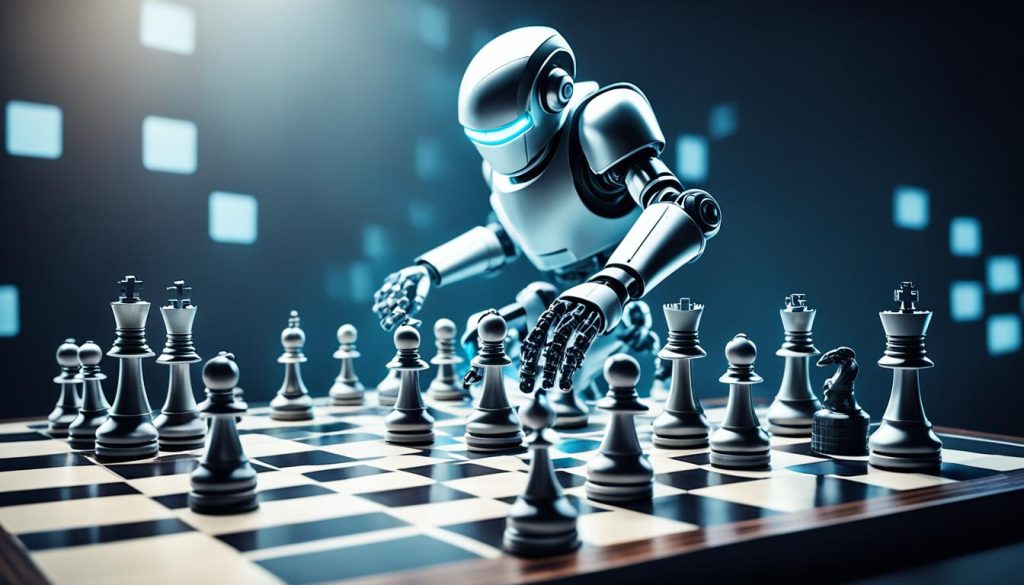Artificial Intelligence and Game Tactics, We are witnessing a remarkable convergence of gaming and artificial intelligence (AI) that is birthing a new frontier ripe with innovation, excitement, and endless possibilities. What was once considered mere entertainment has evolved into a platform for groundbreaking advancements in AI technology and research. The synergy between gaming and AI has led to the development of sophisticated algorithms, realistic virtual environments, and immersive gameplay experiences that challenge the boundaries of what is possible, Artificial Intelligence and Game Tactics
In this dynamic landscape, the interplay between gaming and AI is transforming the way we experience, interact with, and create digital worlds. From enhanced gameplay mechanics to autonomous game generation, the fusion of these two powerful forces is reshaping the future of entertainment, competitive sports, and beyond. As we delve into this captivating intersection, we will explore the ways in which AI is revolutionizing the gaming industry and the broader implications of this technological convergence.
Key Takeaways Artificial Intelligence and Game Tactics
- The convergence of gaming and AI has unlocked a new era of innovation and creativity.
- AI-powered gaming experiences are becoming more realistic, dynamic, and personalized.
- Procedural content generation is enabling the creation of infinitely scalable game worlds.
- AI is empowering players, developers, and sports organizations to push the boundaries of what’s possible.
- Ethical considerations around AI in gaming must be addressed to ensure fair and responsible implementation.
Enhanced Gameplay with AI
The integration of Artificial Intelligence and Game Tactics (AI) in the gaming industry has significantly enhanced the overall gameplay experience for players. From the realistic behavior of non-playable characters (NPCs) to the adaptive nature of adversaries, AI has revolutionized the way we interact with virtual worlds.
Realistic NPC Behavior Artificial Intelligence and Game Tactics
Games like “The Last of Us Part II” and “Red Dead Redemption 2” have employed advanced AI systems that simulate complex human-like behavior, from realistic facial expressions to dynamic decision-making. These AI-powered NPCs exhibit more lifelike responses, making interactions within the game world feel immersive and dynamic.
Adaptive Adversaries Artificial Intelligence and Game Tactics
The days of predictable enemy movements and scripted dialogues are long gone. AI-powered adversaries are now capable of adapting to player strategies and learning from their actions, presenting a more challenging and engaging experience. These intelligent opponents can adapt and respond to the player’s tactics, creating a sense of unpredictability and heightened excitement.
Immersive Virtual Worlds Artificial Intelligence and Game Tactics
The advancements in AI-driven NPC behavior and adaptive adversaries have contributed to the creation of more immersive and lifelike virtual worlds. Players are now able to experience game environments that feel dynamic and responsive, with interactions that mirror real-world experiences. This level of realism and interactivity immerses players in the game, blurring the lines between the virtual and the real.
Procedural Content Generation
AI is revolutionizing gaming through the use of procedural content generation. Traditionally, game developers manually design levels, characters, and environments, a time-consuming process that limits the scope and scale of the game world. However, with the advent of AI algorithms, developers can now employ procedural generation techniques to automatically create vast, diverse, and infinitely scalable game content. Games like “Minecraft” and “No Man’s Sky” leverage procedural generation to create expansive worlds filled with unique landscapes, creatures, and challenges, Artificial Intelligence and Game Tactics
Infinite Game Worlds Artificial Intelligence and Game Tactics
By employing AI-powered procedural generation, games can offer virtually limitless gameplay possibilities, ensuring that no two experiences are ever the same. This not only reduces development time and costs but also enables players to explore uncharted territories and embark on truly epic adventures, with diverse environments and unique challenges at every turn.
Diverse Environments and Challenges
The advancements in AI-driven procedural content generation have allowed game developers to create vast and diverse game worlds that offer players a wealth of exploration and discovery. From lush, verdant landscapes to harsh, barren wastelands, players can immerse themselves in a variety of environments, each with its own set of unique challenges and opportunities. This level of procedural diversity ensures that the gaming experience remains fresh and engaging, constantly presenting players with new obstacles to overcome and discoveries to uncover.
Player Modeling and Personalization
In the rapidly evolving world of gaming, artificial intelligence (AI) is reshaping the way we personalize our gaming experiences. Through sophisticated player modeling techniques, AI algorithms can analyze player behavior, preferences, and skill levels to create truly personalized gaming environments. Games like “Fortnite” and “Overwatch” are leading the charge, utilizing AI-driven matchmaking systems to pair players of similar skill levels, ensuring a fair and competitive gaming experience.
Tailored Difficulty Levels Artificial Intelligence and Game Tactics
By understanding the individual player’s abilities and progress, AI-powered systems can dynamically adjust the difficulty of a game, providing a challenging yet achievable experience for each user. This personalized approach not only keeps players engaged but also helps them improve their skills at a pace that is tailored to their needs, fostering a sense of accomplishment and mastery, Artificial Intelligence and Game Tactics.
Personalized Content Recommendations
Beyond just adapting the gameplay, AI algorithms are also being leveraged to recommend content that aligns with a player’s interests and past preferences. Streaming platforms like Twitch, for instance, utilize AI to suggest videos and live streams that cater to each viewer’s viewing habits, enhancing engagement and satisfaction. This personalized entertainment experience is a testament to the power of AI in the gaming technology and esports landscape.

AI as Game Designers Artificial Intelligence and Game Tactics
Researchers are exploring the intriguing potential of AI systems to autonomously create games, from designing captivating levels and engaging mechanics to generating immersive narratives and distinctive characters. By harnessing the power of machine learning and generative algorithms, AI could revolutionize the game development landscape, democratizing the creative process and allowing anyone to craft their own unique gaming experiences. Projects like “Angelina” and “Game-O-Matic” are already demonstrating the transformative capabilities of AI as game designers, autonomously generating playable game prototypes with minimal human intervention.
Autonomous Game Generation Artificial Intelligence and Game Tactics
While AI-generated games may not yet rival the creativity and ingenuity of human-designed experiences, they offer a glimpse into a future where game development is accessible to all and innovation knows no bounds. By empowering AI to autonomously create games, we can lower the barriers to entry in the gaming industry, enabling more individuals and smaller studios to participate in the creative process and push the boundaries of what is possible in the world of gaming technology and esports.
Democratizing Game Development
The integration of AI in game development has the potential to democratize the industry, making the creation of video games, virtual reality experiences, and augmented reality applications more accessible to a wider audience. As AI algorithms continue to advance in their ability to generate game content, the role of traditional game designers and developers may evolve, shifting towards a more collaborative approach where human creativity and AI-driven innovation work in harmony to bring new gaming experiences to life, Artificial Intelligence and Game Tactics.
Challenges and Ethical Considerations
As we continue to witness the remarkable advancements in AI-driven gaming, we must also address the challenges and ethical considerations that arise. Concerns about algorithmic bias and data privacy are at the forefront, not just in the gaming industry but across the broader technological landscape. As we integrate AI technologies into gaming, it is crucial that we develop and implement these systems responsibly, with a keen focus on promoting inclusivity, diversity, and the overall well-being of players.
Algorithmic Bias and Data Privacy
The integration of AI in gaming raises valid concerns about algorithmic bias and the protection of player data. As AI algorithms are used to power various aspects of the gaming experience, from matchmaking to content recommendations, we must ensure that these systems do not perpetuate biases or discriminate against certain groups of players. Developers, researchers, and policymakers must work together to address these issues and develop AI-powered solutions that are equitable and fair.
Additionally, the vast amounts of personal data collected by gaming platforms and AI systems must be handled with the utmost care and respect for player privacy. Robust data privacy policies and security measures must be implemented to safeguard player information and prevent any unauthorized access or misuse.
Player Autonomy and Addictive Gameplay Artificial Intelligence and Game Tactics
The use of AI in gaming also raises questions about player autonomy and the potential for addictive gameplay experiences. As AI algorithms are employed to personalize and optimize the gaming experience, there is a risk of creating environments that are so engaging and immersive that they can potentially compromise player autonomy and lead to unhealthy levels of engagement.
Developers, researchers, and policymakers must work together to strike a careful balance between the benefits of AI-powered gaming and the potential risks to player health and well-being. This may involve the implementation of responsible gaming practices, such as playtime limits, notification systems, and educational resources to help players maintain a healthy relationship with the games they love.

Gaming Technology and Esports
The integration of Artificial Intelligence and Game Tactics (AI) in the world of esports has revolutionized the competitive gaming landscape. AI-powered systems are being utilized to analyze game footage, optimize player performance, and enhance fan engagement in esports tournaments. By leveraging AI, teams can gain a competitive edge through data-driven strategies and personalized training programs, while fans can enjoy a more immersive and personalized viewing experience.
AI in Esports Tournaments Artificial Intelligence and Game Tactics
AI is playing a crucial role in esports tournaments, where it is being employed to analyze game footage and player strategies. Through the use of advanced algorithms, AI can provide real-time insights and recommendations to coaches and players, helping them refine their tactics and improve their gameplay. This data-driven approach gives teams a competitive advantage, as they can make informed decisions and adapt their strategies based on the insights provided by AI.
Optimizing Player Performance Artificial Intelligence and Game Tactics
In the realm of esports, AI is instrumental in optimizing player performance. By analyzing game footage, player movements, and strategic decision-making, AI algorithms can provide personalized training programs and feedback to help players enhance their skills and reach new heights of performance. This personalized approach ensures that each athlete can perform at their peak, contributing to the overall success of the team.
Enhancing Fan Engagement Artificial Intelligence and Game Tactics
AI is also being leveraged to enhance the fan experience in esports. By analyzing viewer behavior, preferences, and engagement patterns, AI-powered systems can deliver personalized content recommendations, interactive experiences, and customized broadcasts. This tailored approach fosters a deeper connection between fans and their favorite esports teams and players, ultimately driving increased engagement and loyalty within the esports community.
AI in Sports Medicine and Injury Prevention
The application of AI in sports medicine and injury prevention is a testament to the technology’s versatility. AI algorithms are analyzing player biometrics and movement patterns to predict and prevent injuries, ensuring athletes’ health and career longevity. This proactive approach to sports medicine is not only mitigating injury risks but also revolutionizing rehabilitation processes, making it a critical component of modern sports management.
Predictive Analytics for Injury Risks Artificial Intelligence and Game Tactics
By leveraging AI-powered predictive analytics, sports teams and medical professionals can anticipate potential injuries before they occur. These advanced algorithms analyze a wealth of data, including player performance, training load, and physical indicators, to identify patterns and risk factors that may lead to injuries. This allows for targeted interventions and personalized training programs to mitigate the likelihood of injuries, keeping our top athletes in peak condition.
Optimizing Rehabilitation Processes Artificial Intelligence and Game Tactics
The integration of AI is also transforming the rehabilitation process for injured athletes. Through personalized rehabilitation programs, AI-driven systems can monitor an athlete’s progress, adjust treatment plans, and provide real-time feedback to accelerate the recovery process. By optimizing rehabilitation, we can help our athletes return to their respective gaming technology and esports, video games, virtual reality, augmented reality, game development, esports tournaments, game engines, game design, competitive gaming, gaming hardware, and game streaming endeavors more quickly and safely, ensuring they can continue to excel in their chosen fields.

Monetizing AI in the Gaming Industry
The sports industry is on the cusp of a new era, where Artificial Intelligence and Game Tactics (AI) is not just an operational tool but a significant revenue generator. Dynamic pricing strategies, empowered by AI, are revolutionizing ticket sales in the gaming and esports industry. By analyzing factors such as fan demand, weather conditions, and social media trends, AI algorithms are enabling teams to adjust ticket prices in real-time to optimize sales and enhance attendance.
Dynamic Pricing Strategies Artificial Intelligence and Game Tactics
AI-driven dynamic pricing models are transforming the way gaming and esports organizations approach ticket sales. By leveraging predictive analytics, these algorithms can continuously monitor and adjust ticket prices based on a multitude of factors, including player performance, event popularity, and real-time market conditions. This agile approach ensures that teams are able to maximize revenue while providing fans with a fair and accessible pricing structure.
AI-Powered Marketing Campaigns
In the realm of merchandising and marketing, AI is playing a pivotal role in creating targeted campaigns that resonate with fans. By leveraging predictive analytics, sports organizations can tailor their merchandise offerings and marketing messages to specific segments of their fan base, resulting in increased sales and customer loyalty. From personalized product recommendations to intelligent social media marketing, AI is empowering gaming and esports teams to forge deeper connections with their devoted fanbase.
AI as the Ultimate Coach Artificial Intelligence and Game Tactics
AI has emerged as a game-changer in the world of sports coaching, redefining the way teams approach talent acquisition, training, and performance optimization. Through advanced scouting and talent acquisition tools, AI is enabling sports organizations to identify and acquire the best players with unprecedented precision. Baseball teams use AI to analyze swing mechanics and pitch selection, while basketball teams leverage software that provides real-time insights during games, allowing them to build winning rosters.
AI-Driven Talent Scouting Artificial Intelligence and Game Tactics
AI is revolutionizing the way sports teams approach talent acquisition. By analyzing vast amounts of player data, including performance statistics, biometrics, and scouting reports, AI algorithms can identify hidden gems and predict the future success of potential recruits. This advanced talent scouting empowers teams to make informed decisions, ensuring they acquire the right players to build a championship-caliber roster.
Personalized Training Programs
AI is also revolutionizing the way sports teams approach training and health management. Real-time data adjustments via AI-driven prescriptive models deliver targeted training programs, substantially reducing injury risks and elevating athletic performance. This personalized approach ensures that each athlete can perform at their peak while maintaining optimal health, a crucial factor in the success of any sports team.
Real-time Coaching Insights
AI-powered coaching tools are providing coaches with data-driven decisions, real-time feedback, and personalized virtual coaching options. These tools enhance team strategy and athlete development, offering a level of coaching that goes beyond traditional methods. By analyzing game footage and player statistics, AI helps coaches develop strategies that exploit opponents’ weaknesses and play to their team’s strengths.

Fair Play and Privacy in AI-Driven Sports
The pursuit of fair play remains at the heart of sports ethics, and the integration of AI introduces complex variables into this equation. As we leverage gaming technology and esports, video games, virtual reality, augmented reality, and game development to enhance the competitive gaming experience, we must ensure that the use of AI to optimize player performance and decision-making is transparent and maintains the spirit of competition.
Balancing Innovation and Integrity
Moreover, privacy concerns are paramount as AI systems process vast amounts of personal athlete data in the realm of esports tournaments, game engines, and game design. Ensuring that this data is used responsibly and securely is a top priority for sports organizations committed to preserving the integrity of competitive gaming.
Combating Bias in AI Algorithms
Bias in AI algorithms is a significant ethical concern, as it can affect scouting, recruitment, and even game outcomes in the world of competitive gaming, gaming hardware, and game streaming. The industry is actively working to mitigate these biases, ensuring that AI tools are as objective and fair as possible. This includes rigorous testing and refinement of AI systems to prevent any form of discrimination or unfair advantage that could undermine the fairness and integrity of the gaming experience.

Embracing AI for Competitive Advantage
As the world of gaming technology and esports continues to evolve, the sports industry must embrace Artificial Intelligence and Game Tactics (AI) to maintain a competitive edge. From enhancing gameplay experiences and personalized content to leveraging data-driven decision-making and optimizing player performance, AI is poised to transform every aspect of the gaming and esports landscape.
By harnessing the power of AI, sports organizations can stay ahead of the curve, deliver exceptional experiences for players and fans, and secure a dominant position in the rapidly evolving world of competitive gaming. The integration of AI in video games, virtual reality, augmented reality, and game development will provide a distinct advantage, empowering teams to create more immersive and engaging esports tournaments, optimize game engines and design, and deliver personalized experiences for competitive gaming enthusiasts.
As the industry embraces the transformative potential of AI, we will witness a new era of gaming where the boundaries between the virtual and the real become increasingly blurred. By leveraging AI-driven insights and innovations, sports organizations can gain a strategic advantage, captivating players and fans alike with their exceptional gaming experiences, cutting-edge esports tournaments, and industry-leading game streaming platforms.
| AI Application | Competitive Advantage |
|---|---|
| Enhanced Gameplay Experiences | Immersive and dynamic virtual worlds, realistic non-player character behavior, and adaptable adversaries that challenge players, delivering a uniquely engaging gaming experience. |
| Personalized Content and Recommendations | Tailored gaming experiences, personalized training programs, and targeted marketing campaigns that resonate with players and fans, fostering deeper engagement and loyalty. |
| Data-Driven Decision-Making | Predictive analytics, real-time insights, and AI-powered coaching tools that enhance team strategy, player performance optimization, and fan engagement, leading to improved results and a stronger competitive position. |
Conclusion Artificial Intelligence and Game Tactics
The intersection of gaming and Artificial Intelligence and Game Tactics represents a thrilling frontier of innovation and creativity. From enhanced gameplay experiences in video games and virtual reality, to procedural content generation in game development, and personalized gaming with AI-driven recommendations – the possibilities are endless. As technology continues to advance, the boundaries between the virtual and the real blur, ushering in a new era of gaming that promises to captivate and inspire players for generations to come.
The sports industry’s embrace of AI will be crucial for maintaining a competitive edge in the world of esports tournaments and competitive gaming. By leveraging AI in game engines, game design, and optimizing player performance, organizations can deliver exceptional experiences for players and fans alike. From AI-powered predictive analytics for injury prevention to dynamic pricing strategies and AI-driven marketing campaigns, the integration of AI will be vital for the future success of the gaming and esports industry.
As we look ahead, the convergence of gaming technology and Artificial Intelligence and Game Tactics will continue to push the boundaries of what is possible. By harnessing the power of AI, we can create more immersive virtual worlds, develop adaptive adversaries, and empower AI as the ultimate coach for competitive gaming. However, it is important to address the ethical considerations surrounding bias, privacy, and fair play, ensuring that the integration of AI in the gaming industry remains transparent and responsible.
FAQ
How is AI enhancing gameplay experiences in video games?
AI is enhancing gameplay experiences through more realistic NPC (non-playable character) behavior, adaptive adversaries that can learn and respond to player tactics, and the creation of more immersive and lifelike virtual worlds.
How is AI transforming game development through procedural content generation?
AI-powered procedural generation techniques enable the creation of vast, diverse, and infinitely scalable game content, reducing development time and costs while offering players virtually limitless gameplay possibilities.
How is AI being used to personalize gaming experiences for individual players?
AI algorithms can analyze player behavior, preferences, and skill levels to create personalized gaming experiences, including tailored difficulty levels and content recommendations based on individual interests and preferences.
How are researchers exploring the potential of AI to autonomously create games?
Researchers are leveraging machine learning and generative algorithms to enable AI systems to autonomously design levels, mechanics, narratives, and characters, potentially democratizing game development and allowing more individuals and smaller studios to participate in the creative process.
What are some of the challenges and ethical considerations surrounding the integration of AI in gaming?
Key concerns include algorithmic bias, data privacy, player autonomy, and the potential for addictive gameplay experiences. Developers, researchers, and policymakers must work together to ensure AI technologies are implemented responsibly and promote inclusivity, diversity, and player well-being.
How is AI transforming the world of esports?
AI-powered systems are being used in esports to analyze game footage, optimize player performance, and enhance fan engagement, providing teams with a competitive edge through data-driven strategies and personalized training programs, while delivering a more immersive viewing experience for fans.
How is AI revolutionizing sports medicine and injury prevention?
AI algorithms are analyzing player biometrics and movement patterns to predict and prevent injuries, as well as optimize rehabilitation processes, ensuring athletes’ health and career longevity.
How is AI being used to monetize the gaming industry?
AI is enabling dynamic pricing strategies for ticket sales and powering targeted marketing campaigns, helping sports organizations and gaming companies optimize revenue streams and enhance fan engagement.
How is AI transforming the world of sports coaching?
AI is revolutionizing talent scouting, training programs, and real-time coaching insights, enabling sports organizations to build winning rosters, reduce injury risks, and elevate athletic performance through data-driven decisions and personalized approaches.
What ethical considerations surround the use of AI in sports?
Maintaining fair play and addressing concerns about algorithmic bias and data privacy are key priorities as the sports industry increasingly embraces AI technologies. Transparency and responsible implementation are crucial to upholding the integrity of competition.
Source Links
- https://amandinedevergies.com/blog/the-intersection-of-ai-and-sports–a-game-changing-alliance
- https://www.linkedin.com/pulse/exploring-intersection-gaming-artificial-intelligence-żarkiewicz-3ea0e
- https://www.biometrica.com/the-intersection-of-artificial-intelligence-and-the-gaming-industry/
